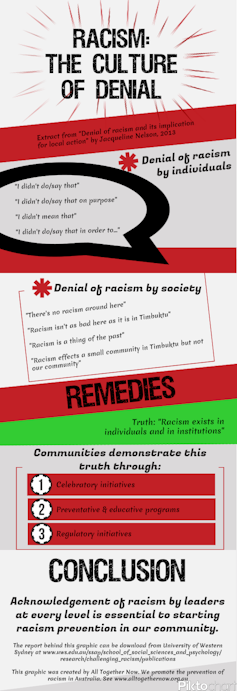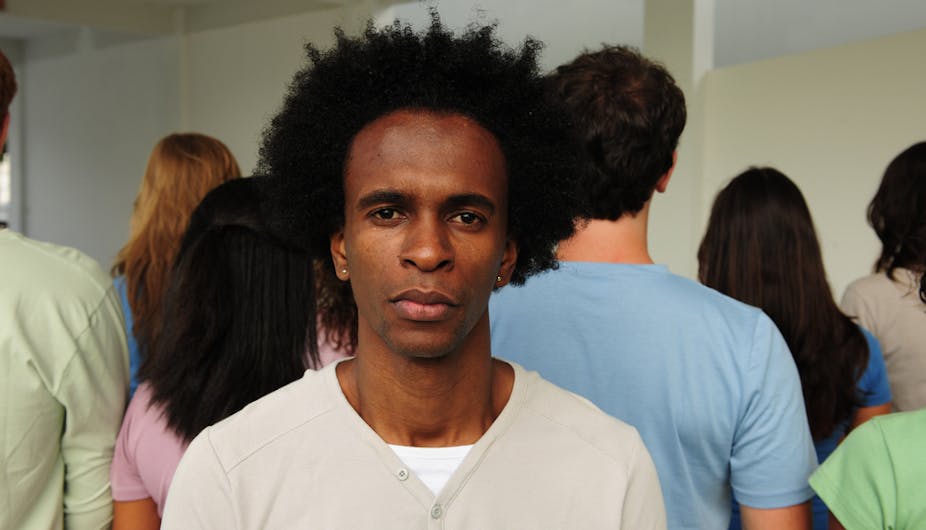There is nothing casual about racism.
But the term “casual racism” has emerged over the last couple of years in media coverage reporting on more extreme forms of interpersonal racism, such as racist slang and racist diatribes on public transport. These incidents occur on a seemingly “casual” or unexpected basis.
While the media focus on these more obvious experiences of racism, in reality racism occurs everyday in both blatant and subtle forms.
Subtle forms of racism often go unnoticed (except for the person feeling the impact of them) and therefore, unaddressed. This racism can include speech and behaviours that treat cultural differences – such as forms of dress, cultural practices, physical features or accents – as problematic, manifesting in disapproving glances, exclusionary body language, and marginalising people’s experiences as invalid.
Subtle forms of racism refer to what researchers have called “everyday racism” since the early 1990s. Everyday racism is so commonplace that it’s often normalised and infused into daily conversations through jokes and stereotypes or through unconscious body gestures and expressions.

The Challenging Racism Project (which the first co-author of this article is a contributor to) has documented Australians’ experiences of racism since 2001. Our research shows the most commonly reported experiences of racism are interpersonal – that is, interactions between people that maintain and reproduce racial inequality. Racist talk, including name-calling and insults, is also widespread, particularly for Indigenous Australians and Australians from non-English speaking backgrounds.
Referring to these types of experiences of racism as “casual” diminishes their importance. “Casual” suggests “irregular”, which is inaccurate and also implies we need not take this type of racism too seriously. Therefore, we prefer not to use the term and instead draw attention to the persistence and prevalence of everyday forms of interpersonal racism.
The power of everyday racism is in its cumulative effect – the ongoing experience of marginalisation and repression can be a heavy burden with future incidents triggering memories of past experiences.
How racism can affect our health
Racism has a range of harmful effects on those targeted, including limiting access to employment, health services and education and reduced workplace productivity. Racism has been linked to mental and physical health problems, particularly depression and anxiety, something the recent Beyond Blue campaign highlights (below).
Our research demonstrates that racism can make people feel that they don’t belong in Australia, even if they were born here or their ancestors have lived in Australia for millennia.
A comment, joke or action doesn’t need to be intentionally hurtful for it to be racism. But understanding this requires us to evaluate words or behaviours by their outcomes, rather than just their intention.

The above Beyond Blue campaign effectively demonstrates this. Avoiding the seat next to an Aboriginal man on the bus could be hurtful, even if it was not intended to be. Imagine how this man might often face similar scenarios on his commute to and from work. Repeated experiences of avoidance accumulate to create stress and discomfort, even mental illness.
Acknowledging racism as a problem, and something worth addressing, is important. As part of our research, we talked to people involved in anti-racism in Australia and identified four types of denial of racism.
Denial included outright dismissal that racism exists, claims that there is no racism in this area, and arguments that racism is a thing of the past. Most importantly for this discussion there were “deflections from the mainstream”. People who “deflected” racism believed that there are a small number of people who are “racists”, but they are quite separate from the rest of us.
A focus on staunch racists shifts our attention towards obvious, sometimes violent forms of racism, and away from subtler everyday racism. We need to recognise and address both.
How to challenge racism
The lion’s share of racism happens in our day-to-day interactions. Yet we also negotiate cultural difference in a productive, or even mundane, way each day.
The act of challenging racism as we see it happening on an everyday basis is important – it demonstrates that any form of racism is socially unacceptable. It also supports the person being targeted and shows other bystanders that you do not condone what is happening.
Over time, if enough people challenge these everyday forms of injustice, we can build awareness and begin to change social norms. In fact, according to the 2001-2008 Challenging Racism surveys, 84% of Australians already think there is racism in Australia and we need to do something to address it.
But it is not always easy to know what to say or do when it happens, or how to respond in ways that will not escalate the situation. Some actions you can take, that do not involve directly confronting the perpetrator, include recording the incident on paper or video, talking to other bystanders to gain support, offering support to the target afterwards or calling the police.
You can also talk to family and friends about what happened and keep the conversation going. Regardless of intent or awareness, racism continues to have damaging effects, both for the people experiencing it and the just society that we all want to live in.
If you’ve experienced race-based discrimination, you can report it to the Australian Human Rights Commission on 1300 656 419. If you’re a child or young person and want to talk to someone for free, call Kids Helpline on 1800 55 1800.

